Commentary on Genesis 48:14
Verse Context: Genesis 48:14 states, "And Israel stretched out his right hand, and laid it upon the head of Ephraim, who was the younger, and his left hand upon Manasseh's head, guiding his hands wittingly; for Manasseh was the firstborn." This verse records a profound moment when Jacob (also called Israel) blesses his grandsons, Ephraim and Manasseh, in a manner that disrupts the traditional order of blessing associated with primogeniture.
Introduction
This commentary draws upon the insights provided by notable public domain theologians, including Matthew Henry, Albert Barnes, and Adam Clarke. Their observations will illuminate the theological, historical, and literary significance of this verse. The act of Jacob crossing his hands in blessing exemplifies a key biblical theme regarding divine favor and the sovereignty of God in the dispensation of blessings.
Theological Insights
Divine Sovereignty
Jacob's deliberate crossing of his hands signifies the overriding of human expectations and traditions. Matthew Henry notes that this action represents God's sovereignty in choosing whom He wills to bless. The choice of Ephraim, the younger, over Manasseh, the elder, showcases that God's grace often operates contrary to human standards. Albert Barnes further emphasizes that God's selection is rooted in His eternal plan and purpose, which is often unfathomable to human reasoning.
Symbolism of Hands
The act of laying hands is rich in biblical symbolism, representing the transmission of blessings and authority. Adam Clarke highlights this as a significant gesture, indicating that Jacob is not merely bestowing material riches but rather spiritual legacy and covenant blessings. Thus, the right hand, which traditionally symbolizes preferential treatment, is intentionally placed on Ephraim, underscoring his future prominence and significance in Israel's history.
Historical Context
The family dynamics within the patriarchal narratives are crucial for understanding the gravity of this moment. Jacob, nearing death, seeks to finalize his lineage's legacy. The chosen blessing of Ephraim over Manasseh reflects a broader biblical pattern where God elevates the unexpected and the marginalized. Matthew Henry points out that this methodology of divine selection is evident throughout Scripture, as seen in the lives of David and Solomon, who were also unlikely candidates in their respective narratives.
Practical Applications
- Embracing God’s Choice: Believers are encouraged to trust in God's choices and timing, recognizing that divine favor does not always align with human expectations or societal norms.
- Valuing Spiritual Legacy: This narrative urges a focus on spiritual inheritance over material gain. Pastors and spiritual leaders should emphasize the importance of instilling faith, values, and the legacy of God's promises in the next generation.
- Overcoming Human Bias: Jacob's action challenges contemporary believers to be vigilant against biases that favor outward appearances or human traditions. God looks at the heart, and He honors faithfulness and obedience regardless of status or order.
Conclusion
Genesis 48:14 is a powerful text that encapsulates themes of divine sovereignty, the importance of blessing, and the subversion of conventional order. Insights from historical and theological perspectives prompt deeper reflection on God's intricate plan for humanity. In a world where ranking and human assessment reign, this verse reinforces the message that divine selection and favor rest in God's hands—an encouragement for all who seek to live under His lordship and embrace His purpose without reservation.


